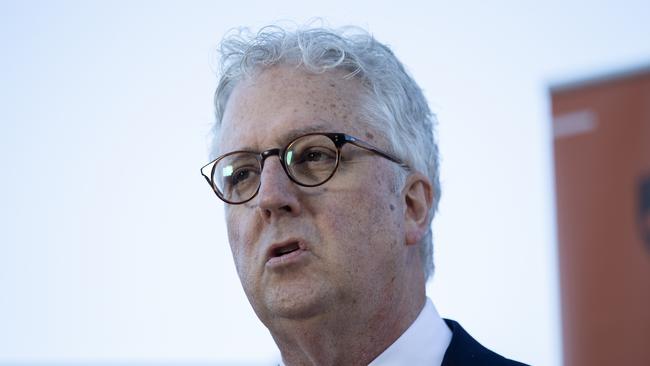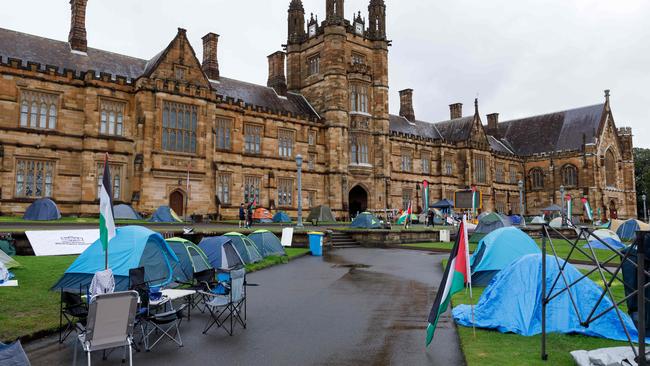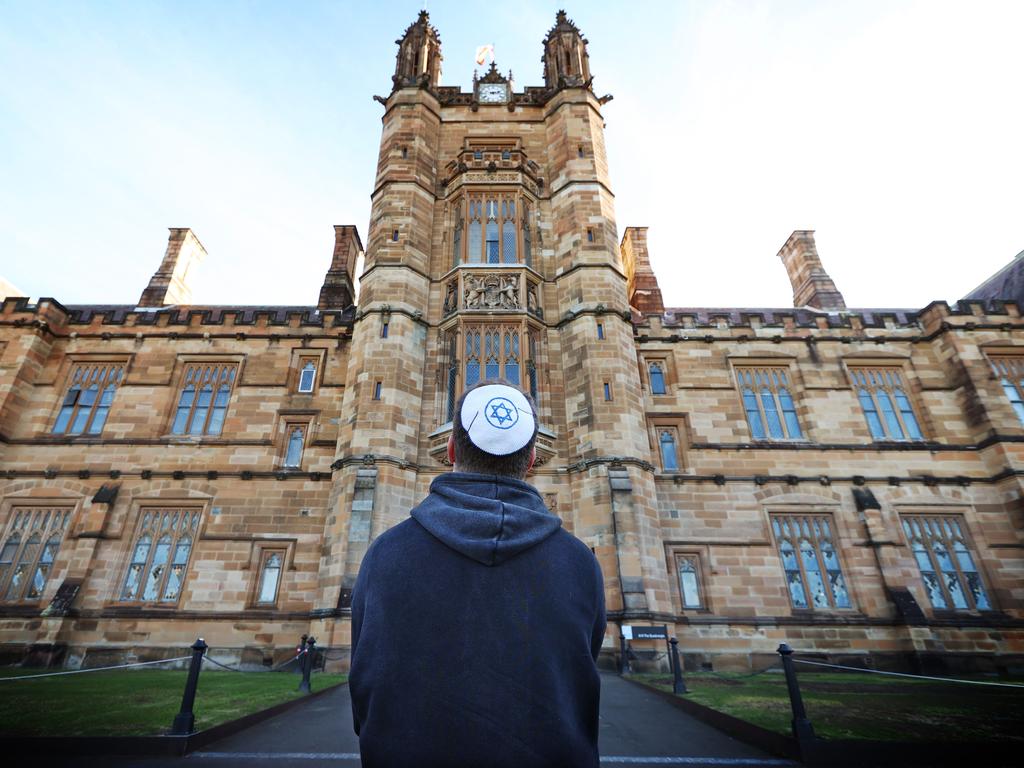Protest camp deal the right call, says University of Sydney vice-chancellor Mark Scott
University of Sydney vice-chancellor Mark Scott has defended the controversial deal he struck with pro-Palestine camp protesters, saying there had been ‘no capitulation here on the key issues’.

University of Sydney vice-chancellor Mark Scott has defended the controversial deal he struck with pro-Palestine camp protesters, saying there had been “no capitulation here on the key issues” and that “the greatest gift I could give to our Jewish students and staff was for the encampment to be gone”.
In a video call on Thursday afternoon, Professor Scott fronted up to donors over mounting pressure about his handling of the protests. Recently, a rare coalition of Jewish groups said it had lost confidence in the university to provide for the safety of Jewish people after it struck a deal with the Sydney University Muslim Students Association, which has been implicated with extremist group Hizb ut-Tahrir.
In the donor call, Professor Scott defended the deal and explained his rationale during the two months the camp was pitched on campus. He stressed that the university had not engaged with Hizb ut-Tahrir.
He said the university had put in place policies that would prevent another camp protest from being pitched and that the university was lobbying the state government to grant it more power to enable it to exclude people from outside the university and enforce stronger powers over its grounds.
Professor Scott also revealed previously unknown details about the stabbing earlier this week at the university, including that various government agencies had told him they suspected the 14-year-old teenage boy alleged to have stabbed the 22-year-old student had a “pattern of radicalisation of the kind linked to white supremacy, anti-Asian sentiment and viewed by police as extreme right-wing radicalisation”.
Professor Scott explained to donors his motivation to bring a negotiated end to the pro-Palestine camp.
“One of the reasons I remain strongly committed to de-escalation of this, to end the encampment, not to just let it drift forever, as has been the case in other places around the world, but more than that, not to end the encampment in a way that would trigger more protests, bigger crowds, more conflict,” he said.
“I thought the greatest gift I could give to our Jewish students and staff was for the encampment to be gone. And one of my profound areas of disappointment and frustration is the loud reaction that came from the ending of the encampment in a way that should have been a – what we really wanted was a happy day here for our Jewish staff and students – became less so as a consequence of some of that media coverage and some of those public statements.”
When asked by a donor whether the university had other options instead of calling in the police in response to unacceptable behaviour, Professor Scott said legal advice on the matter was “really quite open” on whether the university could “simply try and shut up the encampment”.
He said that the new campus access policy announced on Thursday meant that “if they start an encampment, we will be able to suspend them from the university”.

Professor Scott also addressed allegations implicating the Sydney University Muslim Students Association (SUMSA) with Hizb ut-Tahrir, and his decision to strike a deal with the student group.
“Our security forces have engaged with the police around Hizb ut-Tahrir being a presence here – perhaps at some rallies, but I can assure you at all times the undertaking we had from NSW Police is that they would brief us and alert us if, in fact, they had concern at any risk that was being incurred by the presence of outsiders at the university during the time of the rally and during the time of the encampment,” he said.
“And they have not.
“After the 60 Minutes program (on the involvement of Hizb ut-Tahrir in campus protests) went to air, I attended a briefing along with the NSW Police Minister by counter-terrorism on Hizb ut-Tahrir in Australia. They explained why the group has not been identified as a terrorist group, has not been banned, and they also reinforced to us at that meeting, if they were concerned about the kind of people who are visiting our campus during the encampment then they would let us know. And again, they did not.
“That is in no way defending Hizb ut-Tahrir, it’s in no way saying that there is any support or any agreement for some of the things that those at the more radical cleric end might say around some of these issues, but again, this is where we rely on the authorities.
“If that was a banned organisation in NSW or Australia then we of course are in a position to ban them from the University of Sydney. But if they are not banned, if there is no restriction on their operation, if they can be attending rallies that are taking place in the city every weekend without any interruption at all, firstly we aren’t in a position really to identify them and secondly we do not have powers specifically over that group because they are not a banned group and that is a challenge for us and that is an issue we have taken up with the police.
“We have not engaged with Hizb ut-Tahrir at all. I think some of the reporting on this, I think, has been overstated and unreasonable.
“The people we negotiated with were students at the university aged 18, 19, and 20, and the person from SUMSA who will be on a working group of seven to 10 will be one of our students who are involved with that.”
Professor Scott said SUMSA representatives were “much quieter, more respectful, quite distinct” from other camp groups.
He took donors through the large student groups of the camp: “members of the student representative council; there’s another group quite influential called Socialist Alliance, they are very, very left wing – almost anarchist in their approach; and a few other groups.
“What I’d say about them is … they protest on everything, you know. I see them all the time. If there’s a protest going on, SRC, Socialist Alternative, and others, they embrace those issues like they’ve embraced this cause.
“Quite separate in the room was the Muslim Students Association who came along, much quieter, more respectful, quite distinct from the other group.
“(They) also wanted to separate themselves out from the style of engagement that had been the hallmark from some of the others which had been fairly rude and abrasive and confrontational, quite frankly.”
Professor Scott also spoke to donors about the stabbing incident at the campus this week.
“I’ve had contact, significant contact, with the leaders of the Counterterrorism TaskForce here in NSW,” he said. “One of them gave me a call to give me a briefing on the alleged assailant and as you’ll have seen it’s truly a shocking story.
“Fourteen-year-old boy lives close to the university. Terrible history of mental health episodes, a history of threatening violence and also a pattern of radicalisation of the kind linked to white supremacy, anti-Asian sentiment and viewed by police as extreme right-wing radicalisation.
“The police though assured us no link to encampment, no link to religious radicalisation and but truly a terrible story.”
Professor Scott said the first message he got from the 22-year-old victim once he was awake in hospital was for an extension on his honours thesis.
“The one high point we had was when the message came through from the hospital that the student was awake and alert and was keen to get an extension for his honours thesis that was near completion,” he said. “We were able to give him reassurance on that but the fact that that’s where his mind went to, we all took as a very positive sign on a very bleak day.”






